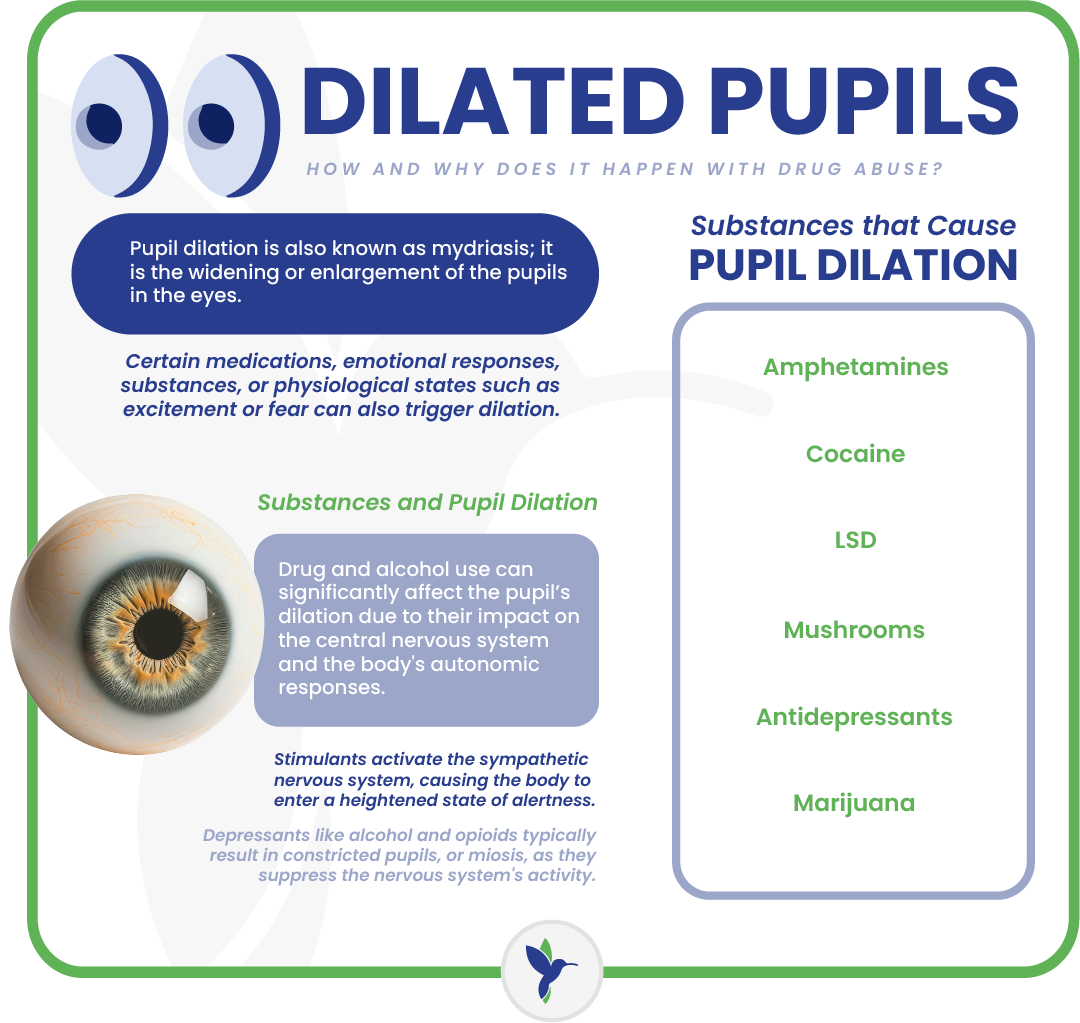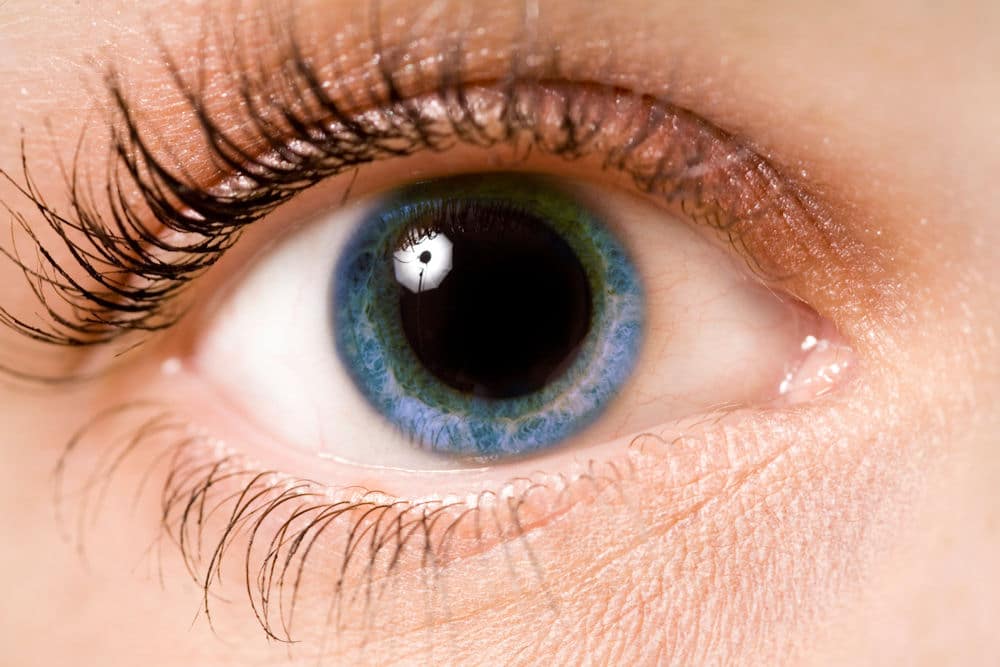Eye problems and substance abuse go hand-in-hand; there is a noteworthy correlation between the two, with various substances leading to different effects on vision. The most common effect drugs have on the eyes is the dilation of the pupils; it is perhaps the most recognizable effect drugs have on the eyes. Dilated pupils are a clear indicator of drug use; these substances interfere with the normal functioning of the autonomic nervous system, directly affecting the muscles that control pupil size. A variety of substances, including stimulants such as cocaine and amphetamines, as well as hallucinogens like LSD, can lead to dilation.
What is Pupil Dilation?
Pupil dilation is also known as mydriasis; it is the widening or enlargement of the pupils in the eyes. This process can occur as a natural response to low light conditions, enabling more light to enter the eye and improve vision. Certain medications, emotional responses, substances, or physiological states such as excitement or fear can also trigger it. The muscles in the iris, which control the size of the pupil, adjust to regulate the amount of light that reaches the retina. Understanding pupil dilation is important in medical and psychological contexts; changes in pupil size can provide insights into a person's neurological and emotional states.

Why is it Important to Understand the Causes of Pupil Dilation?
Understanding the causes of pupil dilation is crucial for several reasons. Medically, changes in pupil size can indicate neurological function and overall health; they can signal conditions ranging from environmental responses to severe medical issues; they could also be key indicators of whether or not a person is under the influence of drugs.
Psychologically, pupil dilation can reveal emotional and cognitive states. This is key in measuring how individuals respond to substances or other stimuli. In clinical settings, knowledge concerning dilation helps doctors diagnose and monitor the progress of treatment for various disorders. This is why understanding the reason behind dilation is so imperative; it expands our comprehension of both physiological and psychological processes.
How Does Substance Misuse Affect the Eyes?
Substance misuse can have a profound impact on the eyes, and it manifests in different ways. Prolonged use of drugs and alcohol can lead to conditions such as dry eyes, retinopathy, and vision loss. Stimulants like cocaine and methamphetamine can cause severe constriction of blood vessels. When this happens, blood flow to the optic nerve is reduced; this could potentially lead to ischemic optic neuropathy (loss of vision due to low blood supply). Alcohol abuse, on the other hand, is often associated with vitamin deficiencies that can result in optic neuropathy and blurred vision.
Additionally, certain substances may cause pupillary changes. This includes dilated or constricted pupils, which can significantly alter normal visual function. Early detection and intervention are crucial in minimizing these detrimental effects on eye health.
How Do Drugs Affect the Nervous System?
Drugs can significantly impact the nervous system by altering the way neurons communicate with each other. Some drugs, such as stimulants, enhance the activity of neurotransmitters, leading to increased alertness and energy. In contrast, depressants slow down this communication, causing relaxation and drowsiness.
Other classes of drugs affect the nervous system in different ways. Opioids bind to receptors in the brain to reduce pain but can also lead to euphoria, which may result in addiction. Generally speaking, long-term use of drugs can lead to changes in brain structure and function. This could cause irreversible damage and affect cognitive abilities, emotional regulation, and overall mental health.
The Role of Sympathetic vs. Parasympathetic Nervous Systems
The sympathetic and parasympathetic nervous systems play crucial roles in the body's response to substance abuse. The sympathetic nervous system is often referred to as the "fight or flight" system; it is responsible for preparing the body for stress or emergencies by increasing heart rate, and blood pressure, and releasing adrenaline. As it relates to substance use disorder, repeated activation from stimulants can lead to heightened stress responses. It could also lead to potential cardiovascular issues.
The parasympathetic nervous system, known as the "rest and digest" system, helps to calm the body and conserve energy. It does this by slowing the heart rate, promoting digestion, and facilitating relaxation. Substance abuse can be a barrier to all of this. This is particularly true with depressants like alcohol and opioids; alcohol and opioids overly activate the parasympathetic system. This results in symptoms such as respiratory depression, lowered heart rate, and impaired cognitive functions. Understanding the relationship between all aspects of the nervous system and substance abuse is imperative; it helps develop effective treatments and interventions for those who struggle with substance abuse.
What Drugs Make Your Pupils Big?

There are a vast amount of particular substances that can cause pupil dilation (a condition known as mydriasis). Some common substances that are known to make pupils big include the following:
- Stimulants such as amphetamines and cocaine
- Hallucinogens like LSD and psilocybin mushrooms
- Certain antidepressants and anticholinergics
In addition to all of this, some over-the-counter medications used to treat allergies or colds can lead to enlarged pupils. However, dilated pupils should not be solely relied upon as an indicator of drug use; pupil dilation is most often a response to low light conditions.
Illicit Drugs Often Cause a Pupil to Dilate
Illicit drugs often cause pupils to dilate. This happens because certain substances stimulate the sympathetic nervous system, leading to the expansion of the pupils. Drugs such as cocaine, amphetamines, and various hallucinogens are known to cause pupil dilation; this can serve as a visible indicator of drug use, though it is worth mentioning that the two are not mutually exclusive. However, understanding these physical manifestations is imperative to addressing substance abuse issues.
The Science Behind Drugs Causing Dilated Pupils
Drug-induced pupil dilation happens when substances interfere with the normal functioning of the eye's muscles. The pupils, controlled by the sphincter and dilator muscles, may dilate when these drugs do one of two things: stimulate the sympathetic nervous system, or inhibit the parasympathetic nervous system. Common culprits include stimulants like amphetamines and certain hallucinogens. Hallucinogens trigger the release of norepinephrine and other neurotransmitters, leading to enhanced sympathetic activity.
Alternatively, anticholinergic drugs, such as atropine, block the action of acetylcholine on the sphincter, preventing the pupils from constricting. This relationship between neural pathways and pharmacological agents is a delicate balance; it emphasizes the complexity of how different drugs can impact a person’s vision.
What are Other Signs and Symptoms Of Substance Use?
Dilated pupils are oftentimes a key indicator of substance abuse. However, as previously mentioned, these two are not mutually exclusive. Some of these signs and symptoms include the following:
- Changes in sleep patterns
- Unexpected weight loss or gain
- Frequent nosebleeds or sniffing
- Sudden changes in social circles
- Deteriorating performance at work or school
- Engaging in secretive or suspicious activities
- Mood swings
- Anxiety
- Paranoia
- Depression
What to Do if Someone Needs Help For Drug Addiction
 If somebody you know needs help with drug addiction, it is important to approach the situation with care, empathy, and support. Nobody who is struggling with an addiction wants to hear about all of the things they’re doing wrong; they want to know that they are loved and supported. This is why it’s imperative to know what to do if somebody needs help for drug addiction.
If somebody you know needs help with drug addiction, it is important to approach the situation with care, empathy, and support. Nobody who is struggling with an addiction wants to hear about all of the things they’re doing wrong; they want to know that they are loved and supported. This is why it’s imperative to know what to do if somebody needs help for drug addiction.
Before anything else, it is imperative to educate yourself about addiction to better understand what you are going through. Encourage them to seek professional help by contacting a healthcare provider or an addiction specialist. Offer to assist them in finding resources, such as support groups, rehabilitation centers, or counseling services. Being patient and non-judgmental goes an incredibly long way; recovery is a long and challenging process. Providing a safe and supportive environment can make a significant difference in their journey toward recovery.
Treatment Programs Offered At Ambrosia
Some of the treatment programs we offer at Ambrosia include the following:
- Intervention
- Detox
- Inpatient treatment
- Medically assisted treatment
- Intensive outpatient treatment
- Outpatient treatment
- Aftercare services
- Holistic treatment
- Therapy options
Addiction Therapy Services
At Ambrosia, our addiction therapy services are designed to provide comprehensive and individualized care to those battling substance abuse. Our qualified team of professionals employs a variety of evidence-based treatment approaches to address the unique needs of each patient. As previously mentioned, some of these include cognitive-behavioral therapy, holistic therapies, and medically-assisted treatments.
We believe in fostering a supportive environment where individuals can rebuild their lives, restore their health, and achieve long-term recovery. Our programs emphasize not only the treatment of addiction but also the development of coping strategies; learning new, healthier coping strategies and life skills is essential for maintaining sobriety.
Recover From Drug Addiction At Ambrosia
Recovering from drug addiction at Ambrosia offers individuals a comprehensive and supportive environment tailored to their unique needs. With a holistic approach to treatment, Ambrosia provides treatment designed to encourage long-term sobriety. If you or a loved one would like to find out more, you can contact us here.



